If you have a deck, stairs, or other structure made with pressure treated lumber, you may not like the look of the brown or green wood surface created by pressure treatment. You may be asking, can you paint pressure treated wood? The short answer is, yes, but it’s a little more complicated than painting wood that isn’t pressure treated. There are a couple of things you need to know about how to prepare the wood before you get out the paint and paint brush. You also need to use the right kind of paint to make this project successful.
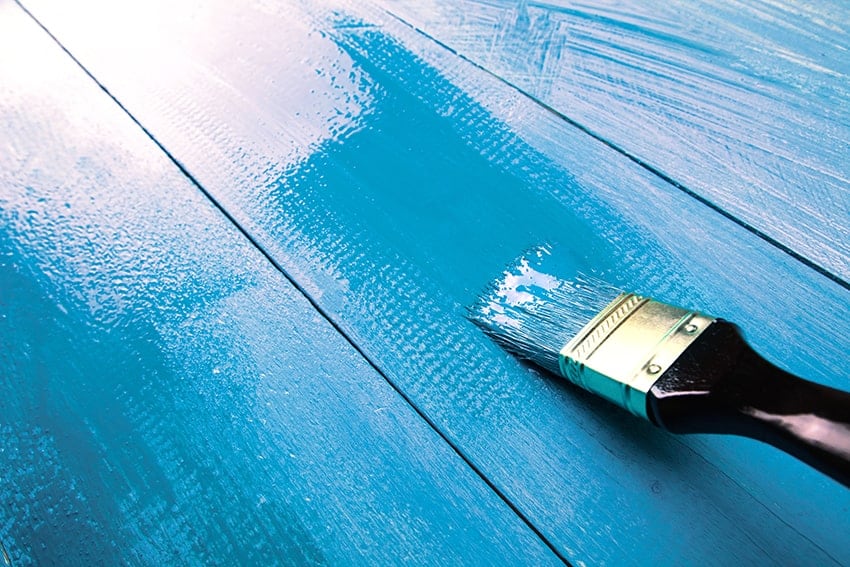
What Exactly is Pressure Treated Wood?
Pressure treating wood is a process done at the lumber mill to make the wood more resistant to rot and fungus attack. When lumber is processed, it is submerged in a vat of chemicals and put under high pressure to get the chemicals to penetrate deeply into the wood grain. After that, the wood is set on racks until it is dry to the touch and ready for sale.
Pressure Treating
There are several different chemicals used for treating lumber. The most common are chromated copper arsenate, or CCA and alkaline copper quaternary, or ACQ. However, building departments are phasing out CCA wood for residential use, so you are more likely to find it on existing structures.
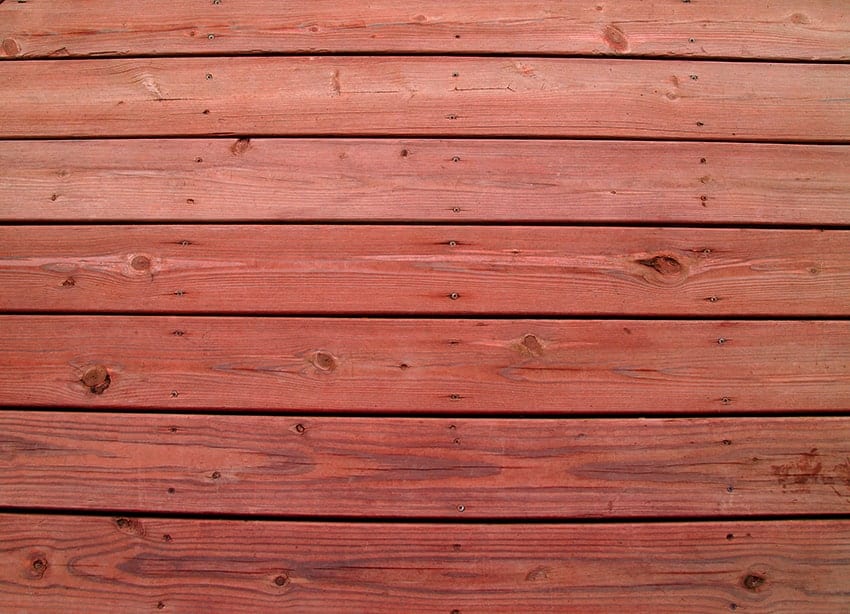
The copper is what often gives pressure treated wood a slightly green tint, although the ACQ treatment makes the final product come out a brown color.
If you look closely at the surface of pressure treated lumber, you will notice small indentations spaced over the board. These help the chemicals penetrate better into the surface of the wood, and their presence is a sure way of determining a piece of wood has been pressure treated, no matter what the color is.
Chemicals
The chemicals used for pressure treating lumber are toxic if you ingest or inhale them. Always use gloves when handling this type of wood, wash your hands after handling it, even when you use gloves, and use a dust mask when you saw or drill holes in pressure treated lumber.
Here are the steps to paint your lumber
1. Dry the Lumber
Unless you use kiln-dried pressure treated wood, one problem with putting a coat of paint on this type of wood is that pressure treated lumber is not thoroughly dry for quite a long time after the chemical pressure treatment. Expect to wait three to four months for new pressure treated wood to completely cure before painting it.
While you can handle new pressure treated boards without noticing the chemicals on your gloves, there is still moisture, pitch, and resin inside the wood which needs time to dry out before you paint it.
Because it is not thoroughly dry, new pressure treated lumber can quickly warp and bend if you don’t handle it correctly. After you buy new pressure treated lumber, build with it right away, or keep it stacked flat in a dry place and wait at least 60 days to four months before painting it. Patience is a crucial ingredient in this project.
Use stickers
If you’re not building right away, prevent the boards from warping by stacking them using stickers – thin pieces of wood slightly wider than the wood you are stacking.
Place the stickers under the bottom piece of wood on the ground at each end of the board and spaced about every four feet under the length of the plank. Then set down your first piece of wood on the bottom stickers.
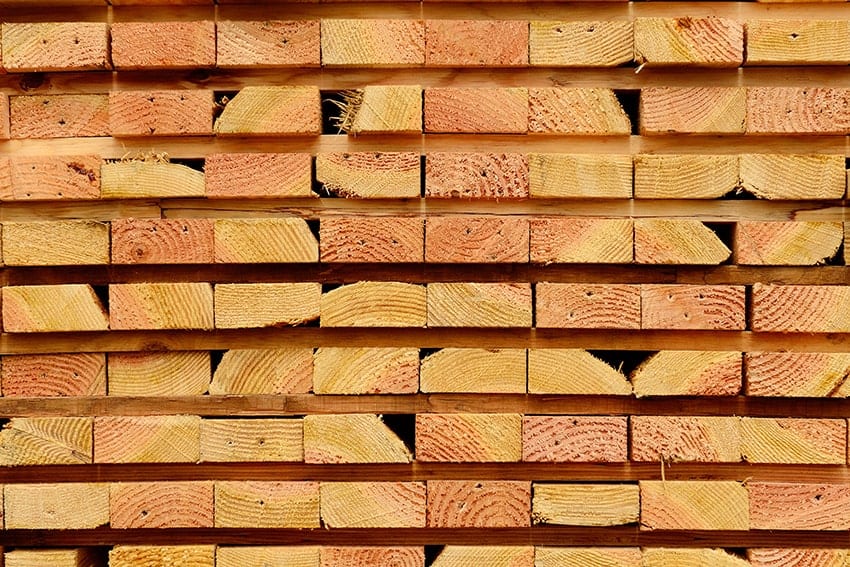
Then put stickers on top of the bottom board, using similar spacing as before, and stack the next piece of lumber on top. The stickers provide air space between the planks and help with drying and keeping the wood flat and straight until you’re ready to use it.
Weather Conditions
Besides making sure your pressure treated lumber is dried out from the treatment process, it’s also essential not to paint any wood if it’s wet from rain or snow.
How can you tell if the chemicals are fully dried out before painting pressure treated wood? There’s a simple test you can use.
Just pour a small amount of water onto the wood and watch what happens. If the water beads up on the surface, the wood is not dried out enough. If the water sinks into the wood grain, it’s dry enough to get out your paint brushes.
Kiln Drying
Kiln-drying involves stacking lumber in a container and applying heat to help it dry faster. Kiln-dried lumber does not warp as easily as wet lumber because all of the moisture evaporates during the drying process.
You can buy kiln-dried pressure treated lumber, also called Kiln-Dried After Treatment, or KDAT, if you don’t want to wait as long for the wood to dry before you paint it.
2. Clean the Wood
If you are painting a pressure treated structure outdoors, the wood may have dirt and grime on it which you need to remove before painting. Also, you need to wash off the chemicals on the surface of the wood before you paint.
It’s simple to do. You will need a hose with a jet nozzle, a stiff brush, and a bucket of water with a mild detergent. Wet the area, scrub with the brush and soapy water, and use the spray of water to clean it off. Don’t use a pressure washer because this can gouge the wood, reducing the effectiveness of the pressure treatment for preventing rot and insect damage.
After cleaning, you’ll need to wait for the wood to dry completely before moving on to the next step.
3. Prime It Thoroughly
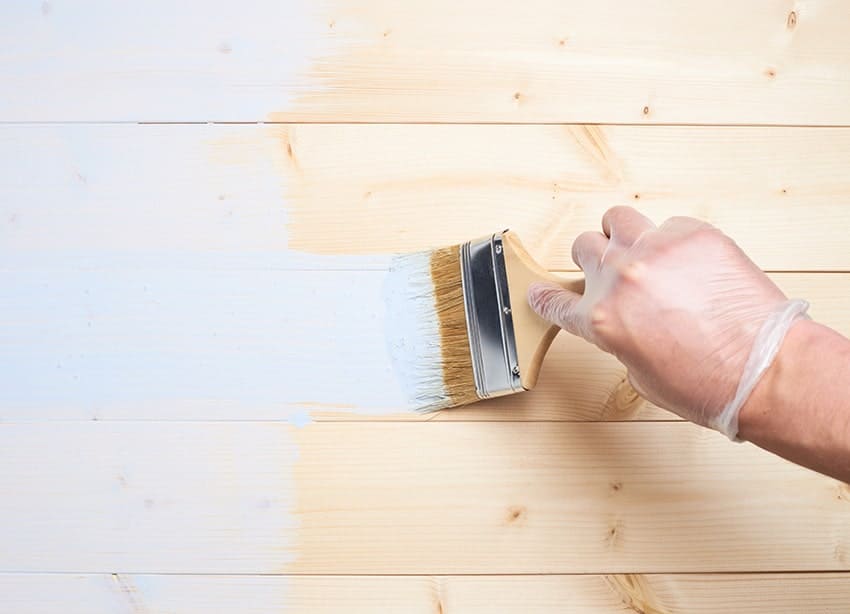
For your final paint job to completely cover the color of the pressure treatment, it is essential to use a high-quality primer before you paint on the finish coats. Be sure the label on the primer says you can use it outside. Using a primer will also ensure the finish coats of paint adhere to the wood surface without peeling.
Apply a coat of primer to all surfaces of the wood you plan to paint, and let it dry for at least one day before moving on to the next step.
You can use a paint sprayer or a paintbrush to apply both the primer and finish coats, but paint rollers probably won’t get paint into all of the crevices on the surface of most pressure treated wood.
4. Top Paint Coats
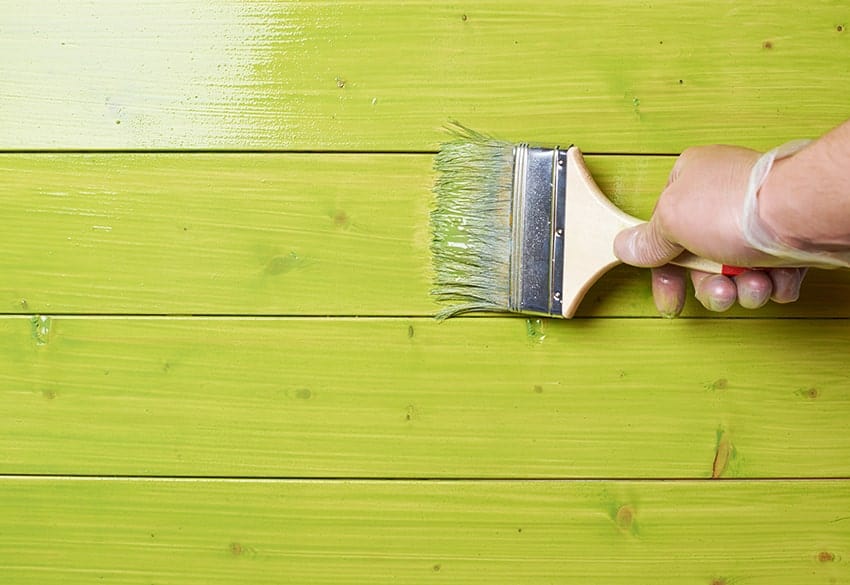
The best paint to use for pressure treated wood is a high-quality, exterior latex paint. If you are installing lumbers in an indoor location, you can use interior paint.
You can choose any color you like, but lighter colors may take more coats to hide the green or brown color underneath completely unless you use a primer. Whatever color you use, plan on doing at least two finish coats over the primer, and wait a day between coats so the paint can dry thoroughly.
It does take a bit more work and patience to paint pressure treated wood than painting untreated lumber. However, if you follow these steps carefully, your finished job will likely come out looking good and lasting a long time.

Can decks older than 10 years be stained
Hi Bob,
Yes, absolutely. The timber is well-seasoned and will take up the stain nicely. Just be sure that the decking is dry, as the lower the moisture content, the better, and clean and prepare the surface as you would for any surface preparation.
I purchased some treated lumber from my local store for the front steps to my home. It has KDHT and SYP stamped on it. I need to know how long before I can paint it. The wood was very wet and heavy. I have read everything from 4 weeks to 6 months.
Hello Bob, The KD stands for kiln dried, the HT for heat treated.
The SYP means it’s Southern Yellow Pine. None of those designations related to the pressure treatment. Really your question has so many variables such as where you live, there is really only one perfect answer, and that is to buy a cheap moisture meter for less than $20 and wait until the wood tests to somewhere between 10 and 15% for exterior timber, or 6 to 8% for interior.
If you don’t want to spend $18 then, yes, it may take a month or so to stabilize and you’ll need to wait until the wood is touch dry and feels lighter. You’ll read of so many so-called ‘teste’ you can do like dripping water on the wood and see if it soaks in or pools, but I’m a little skeptical. Be sure to stack the wood undercover with thin strips between it to allow airflow around each piece, and check each week.
It’s so subjective there is no easy answer I’m afraid. You can buy a two-pin moisture meter like this one quite cheaply on Amazon: https://geni.us/sZBX2xR
The background ….I live adjacent to one of the large NorCal fires from this summer. . Had to remove trees and vegetation in unsuccessful attempt to retain fire insurance. This has necessitated a fence to mitigate road noise, etc.
The project…..I’m using 8′ x 8″ PTW peeler cores every 8 feet with ground contact PTW hemlock horizontals and semi clear polycarbonate corrugated panels (polycarb doesn’t support burning).
The questions….1) does tumescent paint seem appropriate for the PTW on this project?
2) Should I fill the ‘splits’ in the peeler cores prior to paint, or just try to work the paint into them?
Intumescent paint is what I was trying to ask about (not tumescent)
Hi Doc, I’m not sure the brand of intumescent paint you’ll be using, but the one I have experience of suggests that it’s compatible with an acrylic stain sealer, so yes, you should be fine using intumescent paint on the peeler cores (you might want to check the literature on the one you intend to use).
Just remember that copper azole-treated poles need to be seriously dry before painting, and you often don’t get good adhesion with oil-based paints.
My suggestion would be to ensure the posts are well dry following treatment (weeks, not days), and since your focus is fire resistance, I’d seal the splits. Then seal the post with an acrylic stain sealer (get on Amazon: https://geni.us/YWICcl) before applying the intumescent paint.
I have treated boards from fence that was built 3-4 years ago.They have been stored in attic of garage. I want to make a window box with boards and stain it but wood still has green areas from being treated…even after some sanding. can I just stain over green areas? Will it stay green if I do that? Or do I have to lay boards out in sun for months first to get rid of green?
Hi Len,
It really depends on the darkness of the stain you intend to use, but yes, I’d lay them in the sun for a week or so to see if you can reduce the green.
It usually fades to a grey. Then I’d use a water-based stain. It shouldn’t matter, but some oil-based paints do seem to have trouble sticking to treated woods.
While I know you’re not painting it, I’d be cautious and use a water-based stain to be sure.
I always prime new pressure treated wood with an oil based primer. You can paint it with water based in a couple days. Been doing this for 30 yrs
Hello Dale,
You can definitely use water-based paint over oil-based primer but primer needs to be completely dry before painting.
Hi, I am fixing a wood fence new PTW post (4 in by 4 in by 10ft) and adding PTW horizontal slats (1 in x 2 in x 8ft or 10ft boards) very widely separeted (6 inches apart) both from home depot.
Some are very green and look more wet that others. I want to paint them with Timber Oil as I used on my covered deck and looks fantastic. I realized without knowing that I may have to wait if its too wet before finding this article and others regardings PTW and paint. How long do I have to wait to use the timber Oil? Will the wood be ok outside? in rainy south florida? Any other tip as to how to use the timber oil on it or how to speed the process of painting..I want to add a bunch of climbing plants and I may have to wait for that. Also, some slat boards (1x2x10) were labeled #2 PT-board and looked significantly different than the 1x2x8 I got later (My local store did not have the 10) the 8 foot had more grain, more green and more knots. that the 10. Is it because of the #2? Is this referring to quality only? which one would be the better option for a fence (not kiln dried).
thanks!
Hello Agustin.
In any case, it is good to let the wood dry. With proper drying, cracking, and distortion of the wood is minimal.
Drying is more related to the behavior of the wood itself than to the coating. It is important for the drying of the wood not to be in direct sunlight, not to get wet directly and air to circulate through each board.
Covered with a waterproof tarpaulin is also an option for drying. It is good to place between the floor and the first board concrete blocks or other material that does not seep water from the floor.
Follow the other tips in the article.
It is good to dry and process all the wood together, so their humidity will be the same.
I’m not sure what the symbol on the extra boards means. I guess it means it will be cut from a different part of the tree (for example, at the end of the tree, if there are more knots). I don’t think it will have much of an impact on the life of your fence.
To speed up the work of applying the oil, it is good to prepare enough space for work and a place for drying the oil. This will make your job easier. To dry the oil you need a higher air temperature and good ventilation.
Hi,
My home/deck (PTW) is 8+ years old. In that time it was stained twice, but has been pressure washed only, for the last 4 years. There is no stain left on the deck/railing/stairs, etc. and it appears to be bare PTW. Although I’d like to replace it with composite decking, I can’t afford that now. I don’t like the stain colors and definitely want a white railing and spindles. Can just the railings and spindles be painted white with an exterior latex paint? Do I need to prime before painting? Since the deck is small, I can cover the deck planks with an outdoor carpet without worrying about the brown/stain color. Hoping to start this project soon.
TIA for any advice.
Tee
Hi Tee.
First, it is good to wash the pressure again, to remove the remnants of the old coating and for an excellent result sand before application.
It is always good to use a primer, better price, easier work (compacts well, and is easy to sand). Professionals usually use a primer.
For larger projects, I recommend using a primer.
For smaller projects, you can simply use another coat of paint, so you won’t have to buy two different products.
These two articles can be useful when choosing a paint:
https://woodimprove.com/best-wood-primers/
https://woodimprove.com/best-exterior-paints-for-wood/
Hi there,
We just had a deck build with PTW and were told we could paint it in a few days. So we did a cost yesterday and then a friend who apparently know better about these things told me we should have waited until next summer….we are one coat in. What should we do? ????
Hi Leah.
there is a possibility that your treated wood will be dried in an oven or dried before it is placed. This will be the best option for you and you will not have any problems.
If you have painted the wet wood, this is not the best option, but it has already been done.
Honestly, I don’t know if it’s worth removing the cover now. Only time will tell what will happen. You can wait until next summer before moving on. You may need to repair some defects and remove the coating (the coating may peel off) and then apply a new coating (as indicated in the article). ideally, you will simply renew the existing coating.
Hi Will,
I just built my deck with pressure treated wood this summer. It’s been sitting in direct sun light for. About 3 weeks and the greenish color is fading away. Question, do I need to seal the deck with a sealer before painting? Or does the paint act as a sealer to protection from rain and UV rays?
Thanks,
Eddy
You don’t have to seal it before painting but I would recommend it for the best protection and look over time. I would suggest using this primer/sealer by Kilz and this paint by Kilz for exterior floors.
I’m using pressure treated plywood to rebuild the floor and walls of my utility trailer. I need to use the trailer frequently and cannot wait months before painting it. If it rains on the unpainted plywood, how much longer must I keep it garaged to dry out before painting?4
It all depends on the climate you are in to say how long the wood will take to dry. On average wood takes 4 weeks to dry out if the temperature is 60 degrees or above. I would just keep checking on the wood to see if it has dried out yet.
Would painting green treated timbers for a window well help to improve the live of the boards, most of all the dirt side.?
Painting can help with the live of the board. Just make sure you follow all the steps listed on the website for the best results.
Hello, I am painting old pressure treated deck (20+yrs). Do I need to prime wood first
Thanks.
You don’t need to prime the wood first but for the best results and long term durability, I would recommend priming before painting.
I am using PT 6×6 for curbing and drilling to drive rebar (2.5′-3′) to anchor the 6×6. I plan to install pavers between the curbing. My intention is to paint these pieces when/if dry with a concrete or porch paint. Do you think this will dry? It is in the ground 1/2 to 2/3 thickness.
Thank you,
Barry
I do think it will dry it just might take a little longer.
Hi William
Great discussion. Can tannilised C24 studwork be used to construct garden furniture projects if sealed with outdoor varnish or stain? Or is it safer bet to use CLS untreated studwork and outdoor stain or varnish. I also have a batch of tannilised pallet boards, silvery green when planed. Would they be safe for tables, chairs, benches, planters etc if sealed with aforementioned outdoor varnish or stain.
Thanks. Alex. Chatham UK a budding woodworker
As long as the tanalised C24 or the CLS wood is sealed or has an outside varnish on it either one should work for any of those projects. I would suggest a Marine spar varnish for the best protection for the outside wood.
I painted my deck made from treated wood without using primer. Some spots are peeling. What, if anything can I do?
To fully prevent this from happening more, you would have to strip the paint and use a stop peeling primer and repaint the deck. You can use the primer in those certain spots that are peeling if you want. You can also try sealing the deck or using a varnish to give it a coat over the paint to protect it as well. I would recommend this primer or this sealer.
Hi there,
I have had raised garden vegtable beds built, they used new presser treated cedar. I would like to stain them a dark grey/black coloring. Any advise is appreciated
I would recommend using stain by Rust-Oleum like this in the color you want or a stain by Minwax like this in the color you want
We are replacing a few boards on our deck, then I want to paint it. Can I prime and paint soon after new boards are installed? If not, how long do I have to wait?
Yes, you can paint soon after the new boards are installed. If the new boards aren’t stained, I would use a high-quality latex primer or an oil-based primer. If the new wood is already stained I would use a stain-blocking primer. I would use something like this or this.
Hi we are converting a village hall, the upper hall has vaulted ceiling but the roof needed strengthening to prevent spread so joists (10″x3″) have been installed every other rafter and will be exposed in the upper hall which will be bedrooms.
Thing is the joists are tannalised c24 grade planned, they’ve been in for two months and are fairly dry already.
We want to paint them, we are also thinking of planing them a little to remove the worst of the treatment chemicals before painting.
What advice do you have for preparing and painting these, I can share pics if needed.
Many thanks
Great article by the way.
Hi,
I don’t think there are some complicated steps needed here. I suppose the joists are in bad condition or something like that? Sand them properly to remove any treatments, dirt. Also, sanding will provide better adhesion. I don’t really think that using a primer is necessary here, so just paint right after sanding.
The joist are new rough sawn, in reality quite smooth, except the edges. We did your water test and the water droplets just sit on the wood zero absorbtion is happening at the mo….
Hey Al, your comment got trimmed for some reason and I can’t see it in full – can you please re-post it so I can deliver a good answer for it?
If I paint all sides of a 4×6 treated post and leave one side not painted will it dry out eventually?
Hi,
You said it’s treated so it won’t (if treated properly). But of course, the painted wood will be more protected.
I think the question was more about whether it would dry out, not whether it would rot or deteriorate more quickly…I have the same question, started priming it before I saw this article, now I’m wondering if I leave one side unpainted, but leave it out before using it, will it eventually dry out on it’s own? I’m just using a post that I’m going to attach to an outside wall.
Depending on what type of treated wood it is, it won’t dry out. Unless you have KDAT (kiln-dried after treatment) wood it shouldn’t dry out. The wood might “dry” out a little bit on the surface if left bare but it won’t dry out completely.
Would like to paint porch treated wood that has been stained. What should I use
Why do you want to paint the stained wood? Was it stained a long time ago? You either stain or paint the wood. Anyway you can use KILZ Porch as a paint. But to cover the stain you should apply a primer before painting. For a primer, I recommend KILZ Premium.
Had a new deck built out of pressure treated pine this past week 2/16/20.
Looking to paint it white and gray to match the house I am trying to find the best paint for the job. I would like the deck to be a textured paint but not fill in the gaps of 1/4 between the decking boards.
Any advice on primer and paint ?
Thanks
Hi Steven.
For decks, I recommend KILZ Premium as a primer and KILZ Porch and Patio as a paint. KILZ Porch Paint doesn’t have white color, buy there are silver and gray.
My boyfriend had to put up a handrail in his backyard when he added a driveway there. 4×4 posts with 2×4 pieces to make the rail. He made the rail to lay flat rather than up on its edge. Rain was making fine cracks, so he polyurethaned tops of the posts & the rail tops. Also all the ends. The wood can still breathe. Later he plans on doing all 4 sides. It seems to work so far. He used a satin polyurethane so paint can stick to it later on. Not sure if the polyurethane will peel, but it seems to help with splitting & warping as rain runs off.
Hi Virginia.
Polyurethane is a topcoat, not an undercoat for painting/whatever. To restore posts you might have used fillers, hardeners, then seal the wood and finally paint it.
I have a house with an exterior deck built with 2×10 or 12 pressure treated joists. It’s a second story deck. The joists were painted in the past but the paint is cracking and peeling and quite unsightly when looking up at the bottom of the deck from the ground floor. To repaint, would removing all loose paint with a wire brush then following your guidelines (priming, painting) be sufficient? It would be tough to sand them all down! Thanks!
Hi Rob.
Sanding is recommended but isn’t a must. Actually, there are primers requiring no sanding, for example Zinsser BullsEye. I think it should work.
If pressure treated wood can be problematic for painting. Would it be better to have non pressure treated wood on a shed or summer house. Then use a good quality paint system that will sink deep into the wood so as too fully protect it for longer than annually. Just paint it when it looks like refreshing be better?
Hi, Trevor.
I think it will work. The main factor is the quality of paint you’re going to use.
Hi, thank you for this article. When the pressure treated wood is one year old, that is it is now slightly grey, do I need to sand it? Or will the primer do the job without the need of sanding? It’s lots of meters of fence so I’d love to avoid the sanding part.
Also, I love the lively paint on the example photos. Could you please advise where I could get this paint?
Thank you very much,
Hi, Jan.
It depends on a primer. Some primers need thorough sanding, some primers need no sanding at all. But in my opinion, sanding with sandpaper or sander is always preferable, this provides better adhesion.
It’s just a sample photo, sorry. Didn’t have a suitable one for this article. Rust-Oleum is an exterior paint that have many colors. One of them looks like the one from the photo. But Rust-Oleum isn’t the best choice for decks. Other paints suitable for decks don’t have such colors.
I want to paint the (treated) wood support beams for my son’s mailbox. The wood is dry. I want to have it done before he comes back from deployment. What is the best kind of paint and primer to use?
Hi, Lori.
Latex paint/primer would be a good option.